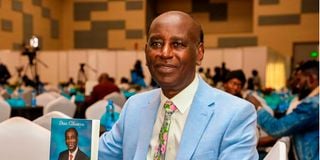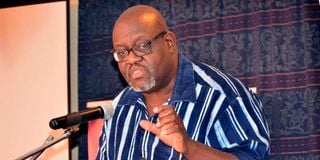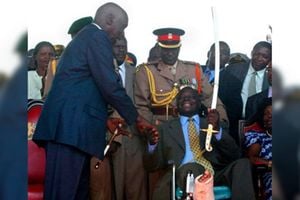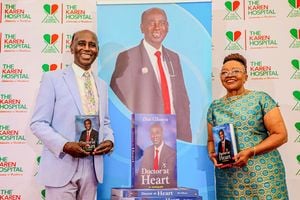Happening Now: Earthwise Summit 2024

Dr Dan Gikonyo during the launch of his book titled Doctor at heart at Sarit Center, Nairobi on September 25, 2024.
It is not always that a doctor features in a book alleging large-scale graft in government, but renowned cardiologist Dan Gikonyo once made such an appearance.
He was named in Michaela Wrong’s 2009 book, It’s Our Turn to Eat: The Story of a Kenyan Whistle-Blower, which was based on the accounts of former journalist and Mwai Kibaki-era ethics czar John Githongo.

Former permanent secretary and anti-corruption crusader, John Githongo.
Dr Gikonyo was mentioned as having gone to Oxford in England alongside then Cabinet minister Amos Kimunya in 2005 to convince Mr Githongo – who had then relocated to the UK after leaving his government job – not to release a dossier he had while the “Yes” versus “No” referendum campaigns were at their peak.
“Kimunya and Gikonyo were there to make sure John did nothing to blow the referendum campaign off course. They kept saying, ‘SWEAR to us, SWEAR that you won’t spill the beans before the referendum. You must swear, John,’” Ms Wrong’s book states.
Now, in his new autobiography, Doctor at Heart, Dr Gikonyo has responded to those claims, and his version of events clashes sharply with that of Ms Wrong and Mr Githongo.
While Ms Wrong wrote that Dr Gikonyo was there as part of a coercion strategy “to negotiate a quiet understanding”, Dr Gikonyo argues that he visited Mr Githongo because he had promised his (Mr Githongo’s) mother that he would pass by Oxford on the way from New York to check on him.
Dr Gikonyo also observes that he had met Mr Kimunya while on the way to see Mr Githongo and the latter requested to join him. The account in the book was that they had “been sent” to him.
When they met Mr Githongo, Dr Gikonyo writes, he had a large overcoat “yet it was not that cold”.
The place Mr Githongo had chosen for the meeting, he writes, was “rather too quiet” and Mr Kimunya suggested that they go to a place where there is “more life”. Dr Gikonyo says he paid for the food at the new eating point.
It was months later that he would hear that their conversation with Mr Githongo had been taped, and Mr Githongo’s argument was that they were there to threaten him.
“I could not believe what I had just heard,” writes Dr Gikonyo in his book.
“Little did we know that, as we enjoyed dinner with my old acquaintance, Githongo, he was after more information to add on to a book he was eager to finish. Githongo went on to use details of our meeting in his book, even implying that The Karen Hospital was a product of corruption, built from the proceeds of Anglo Leasing. I felt betrayed by a friend. I knew very little about the Anglo Leasing saga,” he adds.
“For him to suggest I was a beneficiary was absurd. But as I had learnt from President (Mwai) Kibaki, I sang a church song: ‘These are the people the Lord has made, we will rejoice and be glad with them’. I forgave him. I was persuaded by my friends to sue Githongo when his book was published, but I decided it was not worth the effort,” Dr Gikonyo further writes, going ahead to cite the case where former minister Chris Murungaru was awarded by a court for defamation.
“I was deeply pained by Githongo’s insinuation that I could have benefitted from proceeds of corruption. During this agonising moment, I reflected on my journey right from my early years in the village through to university and to my present fairly privileged position as the President’s physician, and I could not recall any time when I had engaged in corruption,” writes Dr Gikonyo.
Taking his role as the anti-corruption watchdog in Mr Kibaki’s government, Mr Githongo sent shockwaves into the Mwai Kibaki administration by releasing recordings of conversations with powerful government officials. He released his famed dossier shortly after the Orange-versus-Banana referendum, having first ensured it reached President Kibaki.






